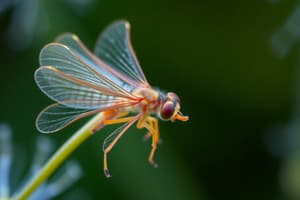Podcast
Questions and Answers
What does the term 'Biology' mean?
What does the term 'Biology' mean?
- Study of ancient organisms
- Study of non-living things
- Study of living things and their vital processes (correct)
- Study of celestial bodies
Which branch of Biology focuses on the study of plants?
Which branch of Biology focuses on the study of plants?
- Botany (correct)
- Marine Biology
- Zoology
- Ecology
What field of study does Entomology refer to?
What field of study does Entomology refer to?
- Study of insects (correct)
- Study of birds
- Study of fungi
- Study of organs
Which branch of Biology concentrates on the internal structure of organisms?
Which branch of Biology concentrates on the internal structure of organisms?
What does Ecology study?
What does Ecology study?
Genetics is concerned with which aspect of organisms?
Genetics is concerned with which aspect of organisms?
Which branch of Biology deals with the structure and function of cells?
Which branch of Biology deals with the structure and function of cells?
What is the purpose of Taxonomy in Biology?
What is the purpose of Taxonomy in Biology?
What does the field of Dermatology study?
What does the field of Dermatology study?
Who is known as the 'Father of Taxonomy'?
Who is known as the 'Father of Taxonomy'?
Which branch of biology deals with the study of viruses?
Which branch of biology deals with the study of viruses?
What is the main focus of Andrology?
What is the main focus of Andrology?
What concept is Charles Darwin most associated with?
What concept is Charles Darwin most associated with?
Who is known as the 'Father of Medicine'?
Who is known as the 'Father of Medicine'?
Which scientific discipline focuses on the study of insects?
Which scientific discipline focuses on the study of insects?
What significant conclusion did Rudolf Virchow make regarding cells?
What significant conclusion did Rudolf Virchow make regarding cells?
Flashcards are hidden until you start studying
Study Notes
Branching Science
- Science is divided into two main categories: Social Science and Natural Science.
- Social Science includes disciplines like Sociology, Civics, and Political Science.
- Natural Science is further divided into Physical Science, Biological Science, and Earth & Space Science.
Categories of Natural Science
- Physical Science: Encompasses Physics and Chemistry.
- Biological Science: Includes Botany, Zoology, Ecology, Microbiology, and Human Anatomy & Physiology.
- Earth & Space Science: Involves Meteorology and Geology.
Definition of Biology
- Biology is derived from Greek: bios (life) and logos (study).
- It focuses on the study of living organisms and their vital processes.
Branches of Biology
- Botany: Study of plants.
- Zoology: Study of animals.
- Microbiology: Study of microorganisms.
Specialized Fields in Biology
- Entomology: Study of insects.
- Mycology: Study of fungi.
- Marine Biology: Study of sea organisms.
- Ornithology: Study of birds.
- Morphology: Study of form and structure of organisms.
- Embryology: Study of prenatal development.
- Anatomy: Study of internal organs.
- Cytology: Study of cells and their functions.
- Histology: Study of tissues.
- Genetics: Study of genes and heredity.
- Ecology: Study of relationships between organisms and their environment.
- Taxonomy: Study of classification and nomenclature of organisms.
- Ophthalmology: Study of eyes.
- Odontology: Study of teeth.
- Dermatology: Study of skin.
- Oncology: Study of cancer.
- Gynecology: Study of female reproductive health.
- Andrology: Study of male reproductive health.
- Ichthyology: Study of fishes.
- Mammalogy: Study of mammals.
- Herpetology: Study of reptiles.
- Virology: Study of viruses.
- Immunology: Study of immune responses.
- Bacteriology: Study of bacteria.
- Phycology: Study of algae.
- Protozoology: Study of protozoa.
Important Figures in Biology
- Aristotle: Known as the Father of Biology and Zoology.
- Theophrastus: Recognized as the Father of Botany.
- Carolus Linnaeus: Father of Taxonomy for his classification system.
- Anton Van Leeuwenhoek: Known as the Father of Microscopy.
- Hippocrates: Regarded as the Father of Medicine.
- Robert Hooke: Known as the Father of Cytology.
- Edward Jenner: Father of Immunology for his work in vaccination.
- Louis Pasteur: Considered the Father of Microbiology.
- Charles Darwin: Famous for the theory of Natural Selection.
- Rudolf Virchow: Father of Cellular Pathology; proposed that all cells come from preexisting cells.
- Theodor Schwann: Proposed the Cell Theory, stating that the cell is the basic unit of all living things.
Studying That Suits You
Use AI to generate personalized quizzes and flashcards to suit your learning preferences.




